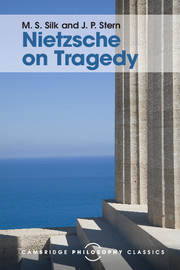Book contents
- Frontmatter
- Dedication
- Epigraph
- Contents
- Preface to this edition
- Preface
- Note
- 1 Germany and Greece
- 2 Biographical background I: Nietzsche and his early interests
- 3 Biographical background II: the genesis of The Birth of Tragedy
- 4 The argument of The Birth of Tragedy
- 5 The aftermath
- 6 Nietzsche's account of Greece
- 7 Mode and originality
- 8 Tragedy, music and aesthetics
- 9 Nietzsche and earlier German theories of tragedy
- 10 Style and philosophy
- Bibliography
- Index
5 - The aftermath
Published online by Cambridge University Press: 05 August 2016
- Frontmatter
- Dedication
- Epigraph
- Contents
- Preface to this edition
- Preface
- Note
- 1 Germany and Greece
- 2 Biographical background I: Nietzsche and his early interests
- 3 Biographical background II: the genesis of The Birth of Tragedy
- 4 The argument of The Birth of Tragedy
- 5 The aftermath
- 6 Nietzsche's account of Greece
- 7 Mode and originality
- 8 Tragedy, music and aesthetics
- 9 Nietzsche and earlier German theories of tragedy
- 10 Style and philosophy
- Bibliography
- Index
Summary
First reactions, Wilamowitz, Rohde
The advance copies of BT appeared in the last days of 1871. On 2 January 1872 Nietzsche sent one to Wagner at Tribschen. In his covering letter he stressed, with extreme deference, the close relation of his book and its theories to Wagner's creative achievements: ‘if I myself think that in essence I am right, then that only means that you with your art must be eternally right… I feel proud that… now people will always link my name with yours.’ At the same time, in the lofty tone appropriate to communication with the Master on such an occasion, he alluded to his misgivings about the public's response: ‘God have mercy on my philologists if they insist on learning nothing now.’ To Rohde, we recall, only a few weeks earlier, he had expressed the more general concern that the book's multifariousness would alienate all his prospective specialist readers, but the philologists above all. On that occasion he had, in fact, put it to his friend that, as far as the philological fraternity was concerned, his book (the central part of which Rohde had now seen) would be in dire need of some ‘higher advertising’ (‘höhere Reklame‘– Nietzsche's inverted commas), and he had suggested that the solution might be an open letter about the book from Rohde, preferably in some scholarly journal. Rohde gladly offered his services: the idea had already occurred to him, although his inclination was to try a less specialized journal, the Litterarische Centralblatt.
Bypassing any such anxieties for the moment, Tribschen responded in tones of ecstasy. Here was its supreme vindication. Wagner wrote by return: ‘I have never read a finer book than yours. It is utterly magnificent.’ And Cosima: ‘How beautiful your book is! How beautiful and how profound – how profound and how daring!… You have conjured up spirits I thought only the Master had at his service.’ As her diary records, she and Wagner spent several days on the book, reading it, discussing it, and enthusing over it. In addition, she indicates that they too were privately uneasy about the public reaction, albeit not quite for Nietzsche's reasons.
- Type
- Chapter
- Information
- Nietzsche on Tragedy , pp. 108 - 156Publisher: Cambridge University PressPrint publication year: 2016

